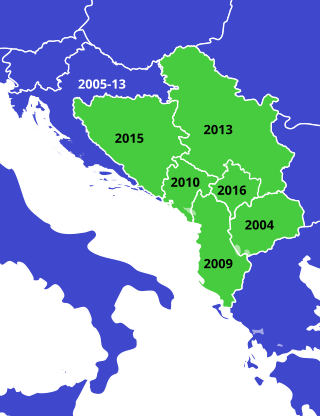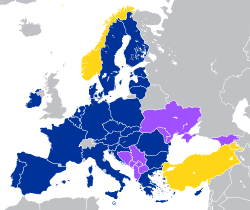
The Community acquis or acquis communautaire, sometimes called the EU acquis and often shortened to acquis, is the accumulated legislation, legal acts and court decisions that constitute the body of European Union law that came into being since 1993. The term is French: acquis meaning "that which has been acquired or obtained", and communautaire meaning "of the community".

The European Council is a collegiate body that defines the overall political direction and priorities of the European Union. The European Council is part of the executive of the European Union (EU), beside the European Commission. It is composed of the heads of state or of government of the EU member states, the President of the European Council, and the President of the European Commission. The High Representative of the Union for Foreign Affairs and Security Policy also takes part in its meetings.

The European Union (EU) has expanded a number of times throughout its history by way of the accession of new member states to the Union. To join the EU, a state needs to fulfil economic and political conditions called the Copenhagen criteria, which require a stable democratic government that respects the rule of law, and its corresponding freedoms and institutions. According to the Maastricht Treaty, each current member state and the European Parliament must agree to any enlargement. The process of enlargement is sometimes referred to as European integration. This term is also used to refer to the intensification of co-operation between EU member states as national governments allow for the gradual harmonisation of national laws.

Andris Piebalgs is a Latvian politician and diplomat who served as European Commissioner for Development at the European Commission from 2010 until 2014. Between 2004 and 2009 he served as Commissioner for Energy. Between 4 June 2016 and 19 August 2017, he served as the leader of the Unity party.

In talks with countries that have expressed a wish to join the European Union, the EU typically concludes Association Agreements in exchange for commitments to political, economic, trade, or human rights reform in that country. In exchange, the country may be offered tariff-free access to some or all EU markets, and financial or technical assistance.

Renewable energy progress in the European Union (EU) is driven by the European Commission's 2023 revision of the Renewable Energy Directive, which raises the EU's binding renewable energy target for 2030 to at least 42.5%, up from the previous target of 32%. Effective since November 20, 2023, across all EU countries, this directive aligns with broader climate objectives, including reducing greenhouse gas emissions by at least 55% by 2030 and achieving climate neutrality by 2050. Additionally, the Energy 2020 strategy exceeded its goals, with the EU achieving a 22.1% share of renewable energy in 2020, surpassing the 20% target.
The Energy Charter Treaty (ECT) is an international agreement which establishes a multilateral framework for cross-border cooperation in the energy industry, principally the fossil fuel industry. The treaty covers all aspects of commercial energy activities including trade, transit, investments and energy efficiency. The treaty contains dispute resolution procedures both for States Parties to the Treaty and as between States and the investors of other States, who have made investments in the territory of the former. Full versions of the treaty, both consolidated and official, are readily accessible.

The energy policy of the European Union focuses on energy security, sustainability, and integrating the energy markets of member states. An increasingly important part of it is climate policy. A key energy policy adopted in 2009 is the 20/20/20 objectives, binding for all EU Member States. The target involved increasing the share of renewable energy in its final energy use to 20%, reduce greenhouse gases by 20% and increase energy efficiency by 20%. After this target was met, new targets for 2030 were set at a 55% reduction of greenhouse gas emissions by 2030 as part of the European Green Deal. After the Russian invasion of Ukraine, the EU's energy policy turned more towards energy security in their REPowerEU policy package, which boosts both renewable deployment and fossil fuel infrastructure for alternative suppliers.
European Union (EU) concepts, acronyms, and jargon are a terminology set that has developed as a form of shorthand, to quickly express a (formal) EU process, an (informal) institutional working practice, or an EU body, function or decision, and which is commonly understood among EU officials or external people who regularly deal with EU institutions.

Interstate Oil and Gas Transportation to Europe (INOGATE) was an international energy co-operation programme between the European Union (EU), the littoral states of the Black and Caspian seas and their neighbouring countries. The programme was operational from 1996 to 2016.

The Council of European Energy Regulators (CEER) is a non-profit organization in which Europe's national energy regulators co-operate to protect consumer interests and to facilitate the creation of a single, competitive, and sustainable internal market for gas and electricity in Europe.

The Union for the Mediterranean is an intergovernmental organization of 43 member states from Europe and the Mediterranean Basin: the 27 EU member states and 16 Mediterranean partner countries from North Africa, Western Asia and Southern Europe. It was founded on 13 July 2008 at the Paris Summit for the Mediterranean, with an aim of reinforcing the Euro-Mediterranean Partnership (Euromed) that was set up in 1995 as the Barcelona Process. Its general secretariat is located in Barcelona, Catalonia, Spain.
The European plan on climate change consists of a range of measures adopted by the members of the European Union to fight against climate change. The plan was launched in March 2007, and after months of tough negotiations between the member countries, it was adopted by the European Parliament in December 2008. The package focuses on emissions cuts, renewables and energy efficiency.

Christos Papoutsis is a Greek socialist politician who has served as Minister for Citizen Protection (2010–12), Mercantile Marine Minister (2000–01) Member of the European Parliament (1984–95) and European Commissioner for Energy and Euratom Supply Agency, Small business and Tourism (1995–1999). He has also served as the Secretary of the Parliamentary Group and Parliamentary Spokesman for the Panhellenic Socialist Movement (PASOK), the majority party in Greece (2009–2010). He also was candidate for Mayor of Athens (2002).

Energy in Moldova describes energy and electricity production, consumption and import in Moldova.

The area of freedom, security and justice (AFSJ) of the European Union (EU) is a policy domain concerning home affairs and migration, justice as well as fundamental rights, developed to address the challenges posed to internal security by collateral effects of the free movement of people and goods in the absence of border controls or customs inspection throughout the Schengen Area, as well as to safeguard adherence to the common European values through ensuring that the fundamental rights of people are respected across the EU.

The European Union (EU) Environmental Policy was initiated in 1973 with the "Environmental Action Programme" at which point the Environmental Unit was formed. The policy has thereafter evolved "to cover a vast landscape of different topics enacted over many decades" (Reuters) and in 2015 the Institute for European Environmental Policy estimated that "the body of EU environmental law" amounted to 500+ directives, regulations and decisions.
"Over the past decades the European Union has put in place a broad range of environmental legislation. As a result, air, water and soil pollution has significantly been reduced. Chemicals legislation has been modernised and the use of many toxic or hazardous substances has been restricted. Today, EU citizens enjoy some of the best water quality in the world"

Poland has been a member state of the European Union since 1 May 2004, with the Treaty of Accession 2003 signed on 16 April 2003 in Athens as the legal basis for Poland's accession to the EU. The actual process of integrating Poland into the EU began with Poland's application for membership in Athens on 8 April 1994, and then the confirmation of the application by all member states in Essen from 9–10 December 1994. Poland's integration into the European Union is a dynamic and continuously ongoing process.

The Energy Taxation Directive or ETD (2003/96/EC) is a European directive, which establishes the framework conditions of the European Union for the taxation of electricity, motor and aviation fuels and most heating fuels. The directive is part of European Union energy law; its core component is the setting of minimum tax rates for all Member States.

The EU–UK Partnership Council is a Joint Committee established upon provisional application of the EU–UK Trade and Cooperation Agreement. It has several governing tasks within the TCA and supplementing agreements between the UK and the EU. Each party to the agreement can refer to the Council any issue relating to the implementation, application and interpretation of the TCA. The council has – in the first years – the power to amend certain parts of the TCA "provided that such amendments are necessary to correct errors, or to address omissions or other deficiencies", and has the ability to delegate certain of its powers to the Trade Partnership Committee or to a Specialised Committee.














